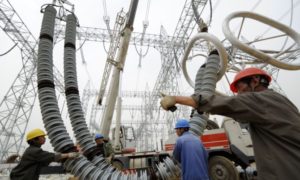Kategori : NATURAL GAS ENERGY NEWS, ELECTRICITY ENERGY NEWS, ENERGY AGENDA NEWS, SOLAR ENERGY NEWS, COAL NEWS, OIL & FUEL SECTOR NEWS - Tarih : 16 February 2019
For the global energy industry, China’s importance is hard to overstate. It is the world’s largest oil importer and is on course to be the largest gas importer this year. It accounts for about half the world’s coal consumption and almost a third of global investment in “clean” energy. If the Chinese economy were to go into a downturn, producers of energy commodities and technologies all around the world would be affected. China accounted for just over a quarter of the increase in world oil demand last year, according to Opec, and is expected to make about the same contribution this year, with its own consumption growth slowing in tandem with the global total. A possible downturn in China, with shockwaves spreading out to other economies, looks like the greatest threat to the stability of oil prices this year.
Discussing Royal Dutch Shell’s fourth-quarter earnings on Thursday, Maarten Wetselaar, the company’s head of integrated gas, pointed out that even in a “mixed” year for China’s economy, its gas demand still  rose by 16 per cent in 2018 and its liquefied natural gas imports grew by 40 per cent. “So if that’s a disappointing year in China, then long may it last,” he said. The push to curb the use of coal to ease local air pollution is a policy priority for the Chinese government and is likely to continue to drive growing demand for gas, regardless of what the economy does. Even so, S&P Global Platts suggested China’s LNG demand was likely to grow at a slower pace this year.
rose by 16 per cent in 2018 and its liquefied natural gas imports grew by 40 per cent. “So if that’s a disappointing year in China, then long may it last,” he said. The push to curb the use of coal to ease local air pollution is a policy priority for the Chinese government and is likely to continue to drive growing demand for gas, regardless of what the economy does. Even so, S&P Global Platts suggested China’s LNG demand was likely to grow at a slower pace this year.
There were mixed signals this week for the prospect of electric vehicles taking a significant bite out of gasoline demand. Tesla, the EV industry’s flagship, unsettled investors when it revealed that its chief financial officer was leaving the company, for a second time, just two years after he had come back to it. The announcement was dropped in as an unexpected sting in the tail at the end of the call to discuss fourth-quarter earnings, That report seemed to show a solid end to 2018, but investors and analysts have been worrying about the strength of demand for Tesla’s “make or break” Model 3. In the wider electric vehicle industry, there is a host of competitors hoping to benefit if Tesla stumbles. The FT’s Patrick McGee wrote about Volkswagen’s plans for a “Tesla killer”: a platform called MEB that is intended to be the basic building block for 50 different electric models that VW promises by 2025. Meanwhile, the first commercial service using electric aircraft aims to start operations in Hawaii this year.
Australia’s heatwave has continued, giving the country its hottest month on record and further inflaming the debate over its electricity system. The US, meanwhile, has been at the opposite extreme, with parts of the country suffering record-breaking cold. John Kemp of Reuters pointed out that the US gas and electricity systems had proved impressively resilient in the face of the bitterly harsh conditions. And finally: the bitter cold created an opportunity for poking some fun at pundits who suggested solar power would not work when it was cold. In fact, high temperatures reduce the efficiency of photovoltaic solar power, and cold weather is better, other conditions being equal. Shorter days, lower sun, cloudy weather and panels covered in snow are legitimate reasons to expect reduced solar output in the winter; low temperatures are not.
Source: “The Week in Energy: China’s Slowdown”, Financial Times





